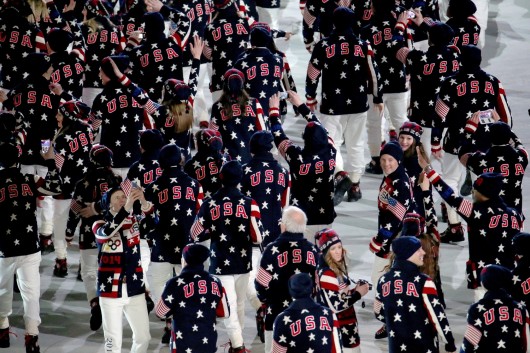
The United States team enters Fisht Olympic Stadium in Sochi, Russia, during the Opening Ceremony for the Winter Olympics Feb. 7.
Credit: Courtesy of MCT
Parts of the Olympic opening ceremonies are always almost the same: the lighting of the torch, the official declaration of the opening of the games, etc.
Other parts give the host countries more artistic license, and some of those parts this year were, well … weird. A significant portion of the strangeness, I’ll freely admit, likely comes from my unfamiliarity with Russian culture and history.
In fact, I’ll offer the disclaimer that it would be fair to say everything I know about Russia I learned from Anna Karenina – and she threw herself in front of a train, so she’s probably not the best resource.
Cultural ignorance aside, however, the closest thing I could compare the dreamscape narrative that followed a young girl named Lubov (Russian for “love”) through thousands of years of Russian history to was a Cirque du Soleil show.
But, as Meredith Vieira and Matt Lauer said repeatedly, these metaphorical reenactments of Russian history were supposedly a big hit with the Russian people who all, allegedly, understood them.
I’m skeptical, but I’ll take their word for it.
Thankfully, the whimsical and seemingly nonsensical performances were punctuated by more familiar Olympic traditions, like the parade of nations.
I’ll give the host credit: The integration of seamlessly projected images on the arena floor for the parade and the performances was well done.
As nations were announced, a globe projected on the floor would spin and highlight the athletes’ country. The athletes would then walk out from a ramp that seemingly came from up the middle of their (projected) country.
In total, 88 nations participated in the parade. As is custom, Greece went first and the host, Russia, went last. The rest went alphabetically – albeit, this time, alphabetically by the Cyrillic alphabet.
NBC’s anchors had fun facts lined up to share with the folks at home about contestants from each country, and NBC’s executives had plenty of ads to interject between nations.
As each nation was announced, the number of athletes from the country was listed on the screen.
But it was the United States who took gold in the category of best uniforms. The ugly sweaters look like something my arthritic great aunt Mary-Lou might create if she were given too much scotch, an American flag and her knitting needles – but I loved them. They’re gaudy, yes – but America is the land of Ke$ha, snuggies and the KFC double down: Since when do we care what anyone thinks of us?
We let our country launch “Twilight,” Justin Bieber and Katherine Heigl into fame, and we’re going to complain about some sweaters? We literally have parties centered on wearing ugly sweaters. Who among us does not love these woolen wonders? Is it the same people who got mad about the Coca-Cola commercial?
Canada took silver with their Mountie-esque uniforms, partly because I thought it was adorable, partly because I desperately want those Canada mittens I bought when Vancouver hosted the previous winter Olympic games to become culturally relevant again.
And the bronze went to the women who accompanied each nation, not for the reasonably stylish, long-sleeve white dresses with a “slit up to there” that they wore, nor for their knee-high white boots, but for their ridiculous blue-and-gold headpieces and those plastic tubes wrapped around them that were emblazoned with the name of the nation they accompanied.
After the parade concluded, it was more of the confusing montage of Russia’s history (which, again, Vieira reminded us, the Russians were loving) and more of the same-old, same-old of the games.
Not to say that the Olympic traditions aren’t extravagant and entertaining. Soprano Anna Netrebko gave a powerful performance of the Olympic anthem, and, after a jog that was given just a tad too much screen time, Russian Olympic greats Vladislav Tretiak and Irina Rodnina lit the torch.
All things included – even the malfunctioning Olympic ring – it was a solid opening to an Olympic games that, with terrorist threats and international political spats about gay rights, have people worried about whether the games will be a success.
Correction: An earlier version of this story said Anna Karenina was a Russian author. In fact, she was a character in a novel by Russian author Leo Tolstoy.


